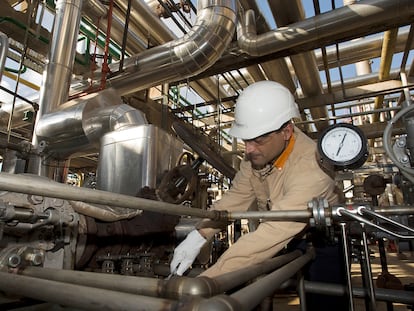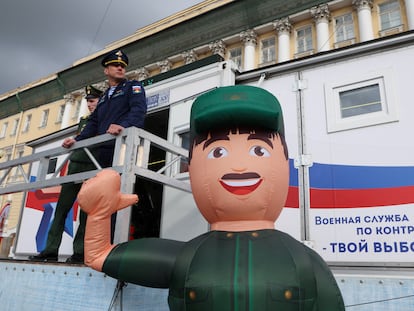Russia’s relentless bombardments: Explosions in Kyiv after a month of peace
Missiles shake two areas of capital causing no civilian victims but significant material damage, a reminder that the entire country remains under threat
Two areas of the Ukrainian capital were shaken by missiles during the early hours of Sunday. At around 6am, shells slammed two neighborhoods in the east of Kyiv, on the left bank of the Dnieper River. The explosions injured one person, according to the mayor, Vitali Klitschko, and significant material damage has been reported. There had been calm in the city for weeks since the previous attack, which left one dead in a residential building on April 28. Kyiv and Moscow have been exchanging accusations about these latest targets while, on the battlefield of Donbas in the east, the Ukrainian and Russian armies continued to fight over control of the city of Severodonetsk, in the Lugansk region.
On Sunday morning, firefighters were working in a facility guarded by the military and in which a structure of around 150 by 50 meters had been destroyed in the Darnitsia neighborhood. According to digital maps, this is the site of a plant for the repair and modernization of military and combat vehicles. The Russian government maintains that it has destroyed tanks and combat vehicles provided to Ukraine by European countries, according to Defense Ministry sources cited by Reuters.
Kyiv authorities have contradicted Moscow, maintaining that the bombed locations did not store tanks. According to statements on Twitter by the head of the railway company, Oleksandr Kamishin, this is a railway junction used for the repair of grain export trains and trucks in the Darnitsia neighborhood. He said that four missiles targeted his infrastructures, where one employee was injured.
The attacks were carried out at approximately 6am from Russian Tupolev TU-95 bomber planes based in the Caspian Sea, according to a statement from the Air Force published on its Facebook profile. One of the missiles, adds the same source, was intercepted in the air and destroyed. The national company in charge of nuclear plants in Ukraine, Energoatom, suspects that one of the missiles that landed in the capital flew very low, close to a plant in the Mikolaiv region, on the coast of the Black Sea.
Trembling with fear, Luba, a 74-year-old neighbor, recounted what happened. “I woke up around 6am, I wanted to charge my cellphone and I heard three explosions. I almost jumped in fright and my hands were shaking. They shoot randomly to scare people,” said the woman, standing on Boryspilska Street in the Darnitsia neighborhood, a few hundred meters from one of the bombed facilities.
At 10am, firefighters were still working in an obliterated warehouse, as white smoke continued to emerge from between the black walls and the metallic roof. Several soldiers guarded the place, while, in the commotion, a police officer tried to prevent drivers stopping to gawk at the scene.
With these attacks, Kyiv has reentered the war that began on February 24. The Sunday explosions are the first in the city since April 28, coinciding with the visit of the Secretary General of the United Nations, António Guterres. A Radio Liberty journalist who was at home died that day from damage to an apartment building.
The fighting since then has taken place predominantly in the east and south of the country, although the government assures that security remains uncertain throughout Ukrainian territory. On June 1, another attack took place in the Lviv region, in the west, bordering Poland. A missile caused damage to train tracks and left five injured.
Meanwhile, the Donbas region continues to be the epicenter of combat. For days, the Ukrainian and Russian military have been fighting street by street for control of the city of Severodonetsk in the Lugansk region. Having acknowledged a few days ago that 70% of the city was under enemy control, the governor, Sergei Gaidai, announced this Sunday that local military have recovered control of half the territory.
Over the last few weeks, despite the loss of half of its three million inhabitants, life in Kyiv has been picking up momentum. The curfew has been delayed until 11pm, many residents have returned to their homes and jobs, and many restaurants, shops and businesses have resumed their activity. There are even some traffic jams at certain times of the day. Sunday’s attack is a reminder for all that the threat remains present throughout the country.
Tu suscripción se está usando en otro dispositivo
¿Quieres añadir otro usuario a tu suscripción?
Si continúas leyendo en este dispositivo, no se podrá leer en el otro.
FlechaTu suscripción se está usando en otro dispositivo y solo puedes acceder a EL PAÍS desde un dispositivo a la vez.
Si quieres compartir tu cuenta, cambia tu suscripción a la modalidad Premium, así podrás añadir otro usuario. Cada uno accederá con su propia cuenta de email, lo que os permitirá personalizar vuestra experiencia en EL PAÍS.
¿Tienes una suscripción de empresa? Accede aquí para contratar más cuentas.
En el caso de no saber quién está usando tu cuenta, te recomendamos cambiar tu contraseña aquí.
Si decides continuar compartiendo tu cuenta, este mensaje se mostrará en tu dispositivo y en el de la otra persona que está usando tu cuenta de forma indefinida, afectando a tu experiencia de lectura. Puedes consultar aquí los términos y condiciones de la suscripción digital.
More information
Últimas noticias
Russian ultranationalism, inflamed by the killing of the hooligan commander ‘Spaniard’
The relentless struggle between factions deepens the Sinaloa war: bodies in coolers and a surge in homicides
‘Doctor Death’, the journalist who has witnessed 105 executions in Florida
Being trans or gay in a migrant detention center: ‘They call me faggot, queer, bitch’
Most viewed
- The low-cost creative revolution: How technology is making art accessible to everyone
- Christian Louboutin: ‘Young people don’t want to be like their parents. And if their parents wear sneakers, they’re going to look for something else’
- All the effects of gentrification in one corner of Mexico’s Colonia Roma
- Liset Menéndez de la Prida, neuroscientist: ‘It’s not normal to constantly seek pleasure; it’s important to be bored, to be calm’
- Christmas loses its festive spirit: ICE fears cast shadow over religious celebrations












































